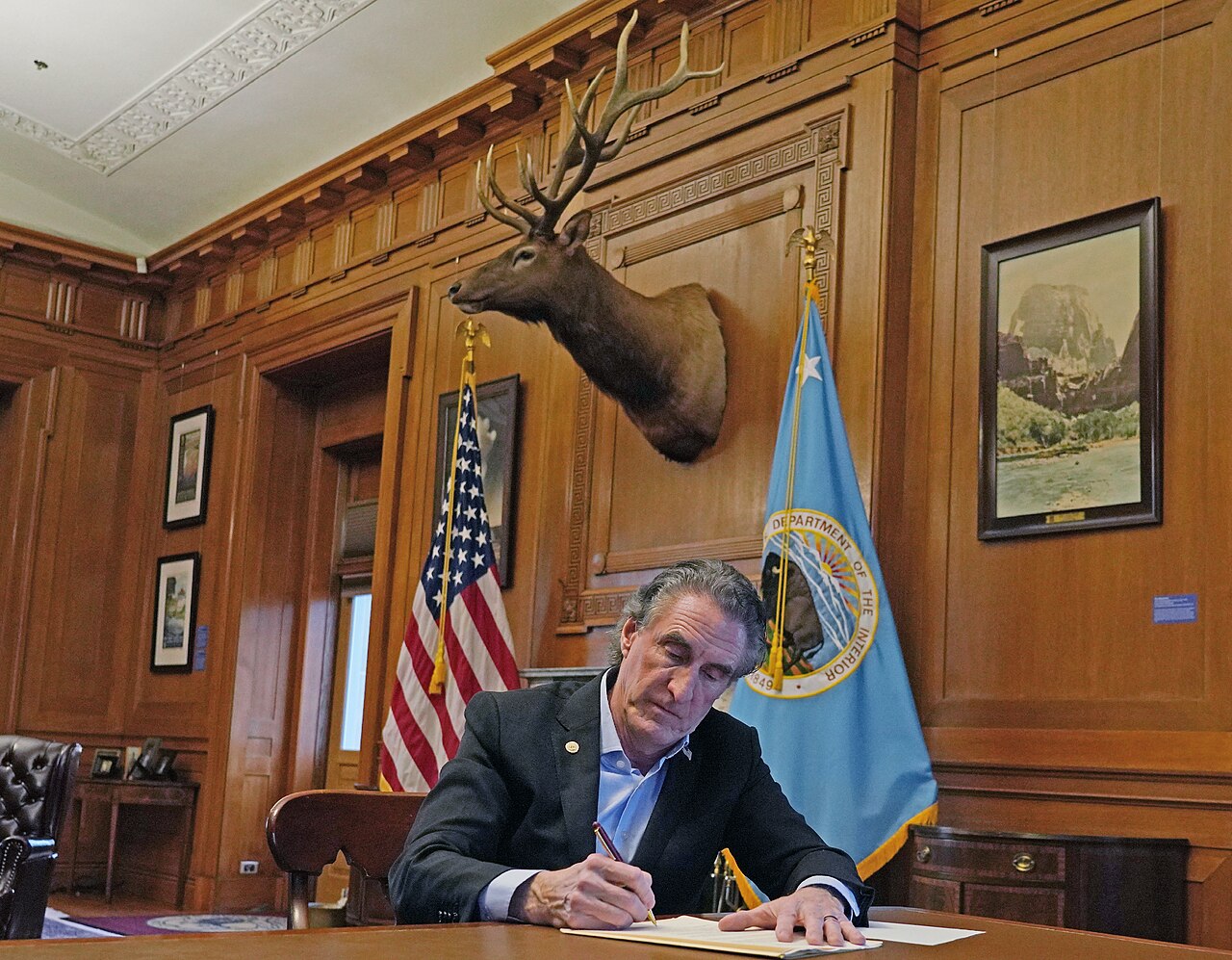
- Details
- By Chez Oxendine
- Energy | Environment
A new Department of Interior policy requiring personal approval from Secretary Doug Burgum for all solar and wind projects threatens to create a bureaucratic bottleneck that could kill tribal renewable energy developments already racing to meet shortened federal tax credit deadlines.
The sweeping requirement, which covers 69 separate activities from leasing to right-of-way permitting, arrives as tribes face a critical July 2026 deadline to begin construction on projects seeking to qualify for federal tax credits under the One Big Beautiful Bill Act. Those credits expire entirely for new projects after 2027.
Tribal energy advocates warn the new review process could push viable projects past eligibility deadlines. The delays would undermine financing and force tribes to abandon renewable projects worth millions in potential economic development growth.
“They already have a backlog of everything from trust land applications to land leases and other work going on over there,” said a tribal tax and land lawyer who requested anonymity. “Adding these extra steps could legitimately kill a lot of these projects if they aren’t timely about the reviews.”
Interior announced the policy July 17, after an internal memo was leaked to the Associated Press before it was publicly released. Officials said the change will ensure “thorough and deliberative” evaluations and “level the playing field” for coal and natural gas.
The policy cites Executive Order 14315 — titled “Ending Market Distorting Subsidies For Unreliable, Foreign-Controlled Energy Sources” — as the impetus for the change.
“These actions further deliver on President Trump’s promise to tackle the Green New Scam and protect the American taxpayers’ dollars,” Acting Assistant Secretary Adam Suess said in a statement. “American Energy Dominance is driven by U.S.-based production of reliable baseload energy, not regulatory favoritism towards unreliable energy projects that are solely dependent on taxpayer subsidies and foreign-sourced equipment.”
But the new policy has drawn criticism beyond Indian Country, with critics characterizing it as a “a tsunami of red tape and roadblocks for private investment” and a “shadow ban” on renewables that contradicts Trump’s stated goal of reducing regulatory burdens on energy development.
“Can you imagine if Secretary Burgum ran his billion-dollar tech company like this — reviewing every single IT ticket himself?” Kabir Green, director of federal affairs for nature at the Natural Resources Defense Council, told Politico. “That kind of micromanagement would paralyze any operation, and here it's being used deliberately to snuff out renewable energy development.”
Critics point to a similar policy enacted by Homeland Security Secretary Kristi Noem, who required her personal approval of all department expenditures over $100,000 — a move that drew criticism after it delayed FEMA’s flood response in Texas. The policy led to a lapse in emergency call center staffing, leading FEMA to miss thousands of assistance calls in the days following the disaster, according to reporting by the New York Times. Tribal advocates warn Burgum’s approach at Interior risks repeating the same mistakes, turning top-level oversight into a choke point that could derail vital projects.
The elevated review requirement arrives as Congress phases out federal tax credits for renewable energy. The One Big Beautiful Bill Act created a two-step phase-out. Projects must enter service December 2027 to claim credits. But projects that begin construction or spend %% of their budget by July 2026 have until 2029 to put their project into service and claim the credit.
Projects that do not start construction by 2027 become ineligible for wind and solar credits entirely. That places many tribal utility scale projects out of the running, per prior Tribal Business News reporting.
Delays in approval could affect both generation facilities and transmission infrastructure serving tribal projects. Any hold-up may push projects past the 2027 deadline, killing financing eligibility and increasing borrowing costs, the tribal tax expert said.
Interior has 45 days to report on implementation to the White House Office of Management and Budget and the Treasury. The report will include recommendations on reconciling the elevated review with expiring tax credits, according to the internal memo.
When asked about the timing of the approvals process, the current backlog of tribal energy projects and assertions that the process was overly cumbersome, an Interior spokesperson declined to comment.
Native leaders push back
The new review policy prompted swift criticism across Indian Country. The Midwest Tribal Energy Resources Association (MTERA) said it would stifle growth in the tribal energy sector.
“This creates significant administrative barriers that could impede Tribal Nations' sovereign rights to develop clean energy projects on their own lands,” MTERA wrote on social media. The nonprofit said the “additional bureaucratic requirements threaten to slow critical renewable energy development across Indian Country.”
The Alliance for Tribal Clean Energy called the policy “a bureaucratic roadblock designed to quietly kill” renewable projects in Indian Country.
“This undermines tribal sovereignty,” Alliance President Cherí Smith wrote on social media. She said the policy threatens “tremendous economic growth, job creation, energy independence, strengthened American energy supply, and national security benefits these projects deliver.”
Meanwhile, legislators are battling proposed cuts to other tribal programs. The Senate Appropriations Committee passed a fiscal 2026 appropriations bill on Thursday, allocating $41.45 billion to Interior overall, $12 billion of which would go to tribal programs. The Senate bill ignores nearly $1 billion in proposed cuts to those tribal programs.
Brian Edwards contributed reporting.
